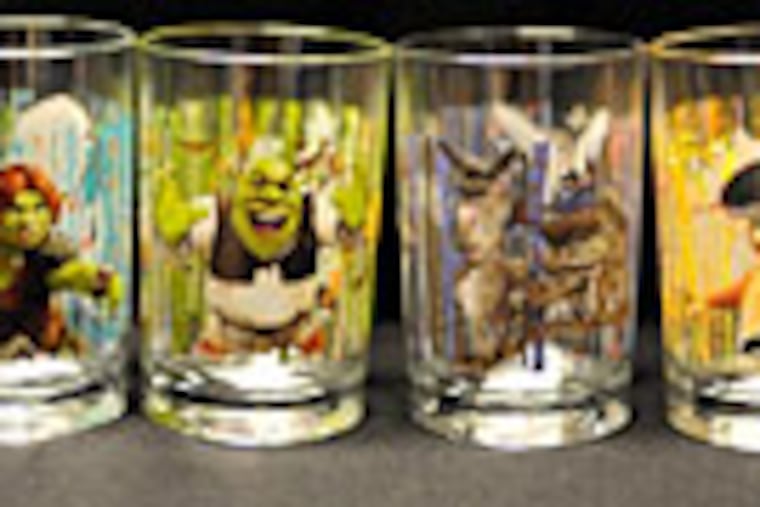Cadmium in 'Shrek' glasses could extend to past souvenirs
McDonald's Corp. recalled 12 million Shrek souvenir glasses this month "out of an abundance of caution" after the Consumer Product Safety Commission (CPSC) warned of a risk that children could get small amounts of cadmium on their hands by holding the glasses.

McDonald's Corp. recalled 12 million Shrek souvenir glasses this month "out of an abundance of caution" after the Consumer Product Safety Commission (CPSC) warned of a risk that children could get small amounts of cadmium on their hands by holding the glasses.
But a lawyer and children's-product activist says the risk may extend beyond the Shrek Forever After glasses - at least to similar glasses distributed after the previous Shrek movie, and possibly to the wider category of brightly decorated souvenir glasses.
The Shrek Forever After glasses, made in South Jersey by a French manufacturer, were sold for $1.99 or $2.49 at McDonald's in May and early June. To encourage their return after CPSC tests showed risk of cadmium exposure, the chain offered to buy them back for $3 apiece.
Jennifer Taggart, a California lawyer whose initial tests helped alert the CPSC to the cadmium on the Shrek glasses, performed a similar test last week on two glasses that McDonald's distributed in 2007 after release of Shrek the Third. She said the test, called X-ray fluorescence (XRF), showed they contained cadmium-based pigments and likely posed a similar low-level risk.
"I guess I kind of expected it," said Taggart, who runs the website TheSmartMama.com and has been active in California's efforts to limit exposure to toxic substances. Cadmium, a heavy metal that accumulates in the body, can cause cancer, developmental and reproductive damage, and other health problems.
Taggart did not perform further tests to assess exposure risk, such as the "wipe test," in which a moistened cloth is wiped across a surface to estimate how much of a substance might transfer to a person's hand or mouth - the key test the CPSC cited. But she said she expected such tests to show similar results because the Shrek Forever After glasses tested positive even though they apparently meet current legal standards.
Scott Wolfson, a CPSC spokesman, said the agency had not seen the results of Taggart's latest tests but was continuing its own inquiries.
"CPSC is doing additional follow-up work in the aftermath of the recall," Wolfson said. "The case is not closed."
Wolfson said the agency remained more concerned about Chinese-made children's jewelry that is nearly solid cadmium, because it poses greater exposure risk if put in the mouth or swallowed. But he said the agency was developing new limits for cadmium in other children's products, such as the Shrek glassware.
"What we're really striving to do is make sure that there is a protective environment for children when it comes to products that should not be made with cadmium," Wolfson said. He said agency Chairwoman Inez Moore Tenenbaum recently warned Asian regulators that the CPSC was on guard for evidence that toy- and jewelry-makers might use cadmium to replace highly toxic lead.
That sort of substitution does not appear to be what happened with the Shrek Forever After glasses, whose recall still seems to baffle Arc International, the company that made them at its Millville, N.J., plant.
"There is nothing wrong with the manufacturing process," José-Maria Aulotte, Arc's senior vice president, said last week after what he called a routine visit to the Cumberland County facility, which Arc opened in 1982 and which employs 750 people.
Aulotte said the cadmium-based pigments are made in Germany - not France, as a McDonald's spokeswoman stated - and are legal "in all countries we do business in."
He said the pigments are used in red and yellow enamels, and in combinations such as oranges and greens. Once decorated, the glasses are fired at 1,100 degrees Fahrenheit in a process called vitrification, which Aulotte said locks the enamels to the glassware.
"We're confident all Arc International products are safe for use by children and adults, and are unaware of harmful exposure related to these pigments," he said via e-mail. "It is important to remember that the recall of the glasses was voluntary and taken out of an abundance of caution."
Aulotte said he was puzzled that the CPSC tests suggested that routine handling could lead to cadmium exposure.
"It depends on what you do with it. But if you just carry the glass, it should not come off," Aulotte said.
Arc officials did not respond to a request for comment about Taggart's new tests. A McDonald's spokesman reiterated that the recall was limited to this year's Shrek glasses.
"Past glassware met all our safety standards and complied with all federal regulations," McDonald's spokesman William Whitman said in a statement.
Wolfson, the CPSC spokesman, said risk-conscious parents might want to consider using a souvenir glass simply as a souvenir.
"If a parent wanted to be as cautious as possible," Wolfson said, "they should consider not allowing their child to use it as a drinking glass - to keep it as a collectible or just allow it for adult use only."